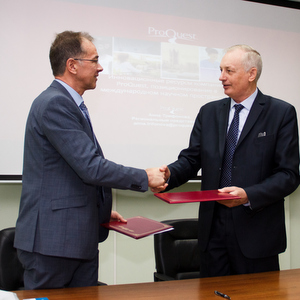On Wednesday, October 24, Samara National Research University became a member of the international ProQuest Dissertations & Theses Global (PQDT) project. The corresponding agreement was signed by Rector of Samara University
Evgeniy Shakhmatov, and Head of the International Content project of ProQuest theses database
Meinhard Kettler.
The agreement envisages that the dissertations defended by the scientists of Samara University will be placed in the world's largest database of Doctoral, Candidate's and Master's theses of universities from almost a hundred countries. In Russia, 60 universities are its subscribers, but only five universities have the right to place theses there – M.V. Lomonosov Moscow State University , St. Petersburg State University, Financial University under the Government of the Russian Federation, RANEPA and Siberian Federal University. From today Samara University has joined their ranks.
“We are joining a large family of scientists,” – Yevgeniy Shakhmatov said, signing the agreement. –This is a historic event for us. We are already using the resources of this database, but now the interaction is reaching a new level: Samara University scientists will be able to post the full texts of their theses into ProQuest. The students, researchers of the university have access to a huge information base in which there are several thousand world-class journals, millions of full-text theses". The Rector emphasized that the cooperation with ProQuest will help in promoting the university at the international level, since the university scientists will be able to get an assessment from colleagues from around the world, which will increase the number of citations.
Meinhard Kettler noted that scientists from more than 2000 scientific and educational organizations, as well as from 92 top universities of the TOP-100 Global THE World University Rankings, place their papers in ProQuest collection. Harvard and Princeton Universities have been cooperating with this company on a regular basis for more than half a century. "I am pleased to welcome Samara University to their number. Our theses base is the official repository of the Library of Congress, it contains 4.5 million theses from 88 countries, — Mr. Kettler noted. — Among them there are the works of such people as Martin Luther King, Mark Zuckerberg, Madeleine Albright. We have no restrictions on the topics of the theses. Send us your papers, we will be glad to receive them, and the authors of the "downloaded" works will receive a fee".
According to the contract, the inclusion of the defended at the university theses into the ProQuest database will be free. Those staff members who defended their theses in other universities of the country and the world can also place their papers in the collection. According to Head of Samara University Library Oksana Petrova, the first theses will be uploaded into the database this year. "Now we are working on the upload algorithm, — said Oksana Vladimirovna. — We are also ready to send theses from the archive (which are now in a closed part of the university repository) to the collection. This process will begin when we will obtain the consent of the authors".
Theses hosted in the ProQuest collections are made available to researchers and students from more than 3,000 resource subscriber organizations in the world, which will greatly expand the possibilities of citing works. Among the advantages there is also the fact that ProQuest database is indexed by the leading subject-oriented abstract bibliographic indexes (ERIC, INSPEC, GeoRef, SciFinder, etc.), which further expands the audience of end-users. In addition, scientists are not limited in their rights: they can also publish their works in other sources.
To place the thesis in ProQuest network, it is necessary to pass verification, that is, to confirm that the thesis was really defended. The author consents to the placement of the thesis and provides an abstract of the work, bibliographic and output data in the English language. The work itself does not need to be translated into English – at this moment in the database there are dissertations in 40 languages of the world.
ProQuest LLC is a US information and technology company founded in 1938. It is one of the world leaders in the field of information products and technologies for science, education and business. ProQuest provides specialists with access to relevant and authoritative information within an integrated search platform that has a Russian-language interface, opening access to 74 databases and electronic libraries.
ProQuest Dissertations & Theses Global is a unique database of full-text doctoral and master's theses defended at universities and research centres of North and Latin America, Europe, Asia and Australia.
PQDT is the largest in terms of volume relevant collection of Master’s and Doctor’s theses. At the suggestion of the Library of Congress, since the second half of the 1990s the database has become the Federal Electronic Depository of Theses Defended in the United States. Since the beginning of the 90s, the database has become international. Universities, colleges, scientific centres from 88 countries of the world include their theses to this collection. The archive contains works since 1637 (bibliographies and annotations), and full texts since 1743. The database is updated quarterly, 200 thousand theses are added to the database within a year.
In Samara University there are 14 Dissertation Councils for defending theses in 29 scientific specialties. Since 2012 Samara University has been a subscriber to the company's databases: ProQuest Technology Collection (2012), ProQuest Dissertations & Theses (2012-2015), ProQuest Dissertations & Theses Global (2016), Ebrary (2017).
Photo: Darya Aksenova
